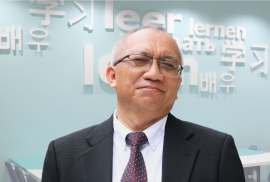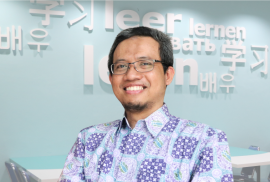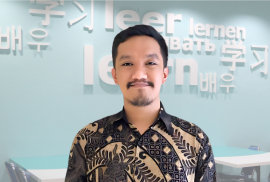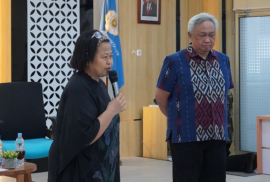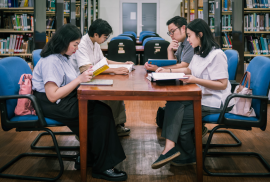The research group of Faculty of Psychology UGM which is incorporated in Hypnotic Guided Imagery and Transpersonal Research Studio (HGI Studio) held a workshop entitled “Clinical Hypnosis and Neuroscience: EEG Reading and Its Application in Psychology” on Friday (21/6), in Room A-203, Faculty of Psychology UGM. This workshop is the first part of a three-part series aimed at exploring the science related to the field of clinical hypnosis.
The mixed event was attended by 72 participants from various professional backgrounds and institutions, including researchers, doctors, and psychologists from puskesmas, hospitals, clinics, pharmacies, universities, companies, and professional organizations.
Prof. Dra. Kwartarini Wahyu Yuniarti, M.Med.Sc., Ph.D., Psychologist, as Principal Investigator of HGI Studio and workshop moderator, opened the event by providing an overview of the research that has been carried out since 2019. This research is funded by the Productive Innovative Research of the Education Fund Management Institution of the Indonesian Ministry of Finance (RISPRO – LPDP). This research aims to develop measurements of human emotions using psychophysiological equipment such as EEG, HRV, GSR, and body temperature.
The research, which has entered its third year, is also supported by nine research centers from various universities in Indonesia, including North Sumatra University, Gunadarma University, Padjadjaran University, Maranatha University, Diponegoro University, Widya Mandala Christian University in Surabaya, Udayana University, and Ganesha University of Education.
Prof. Kwartarini explained that the rampant phenomenon of gendam and fraud became the basis of her interest in studying hypnosis further. From her findings, the use of hypnosis in therapy resulted in rapid changes for cases such as smoking cessation or specific phobias through memory reconstruction. In her exploration, Prof. Kwartarini met with various experts and realized the need for in-depth understanding so that clinical hypnotherapy can be utilized optimally. Therefore, in this workshop she invited Prof. Ismail to explain the process of memory reconstruction from a physiological perspective.
Prof. Dr. dr. Ismail Setyopranoto, Sp.S (K), is a professor of Neurology from the Department of Neurology, Faculty of Public Health Medicine and Nursing (FKKMK) UGM.
“Our organs other than the brain only receive orders,” explained Prof. Ismail. When the body receives a signal such as pain, there is a process where the signal can be amplified or ignored. This process involves chemicals such as tnf alpha and tnf beta, where tnf beta acts as a protector. With proper regulation, stress, confusion or pain can be minimized.
Furthermore, Prof. Ismail explained about the concept of balance in the body, called the interior milieu. According to him, it is important not to see bacteria as an enemy that must be eliminated immediately, because our bodies need antibodies to fight infection. The same goes for stress, which is important to manage well in children in order to maintain their mental health.
“Don’t assume that a child who learns to walk and then falls is stopped. It is a process of balance between inhibition and excitation,” she explained.
This workshop is expected to provide a deep understanding of the integration between clinical hypnosis and neuroscience and its application in modern psychological practice.
The first part of this workshop can be watched through the Knowledge Channel of the Faculty of Psychology UGM.
Author: Edwin Gandawijaya
Editor: Erna Tri Nofiyana
Photo: Yunissa Meganingtyas



